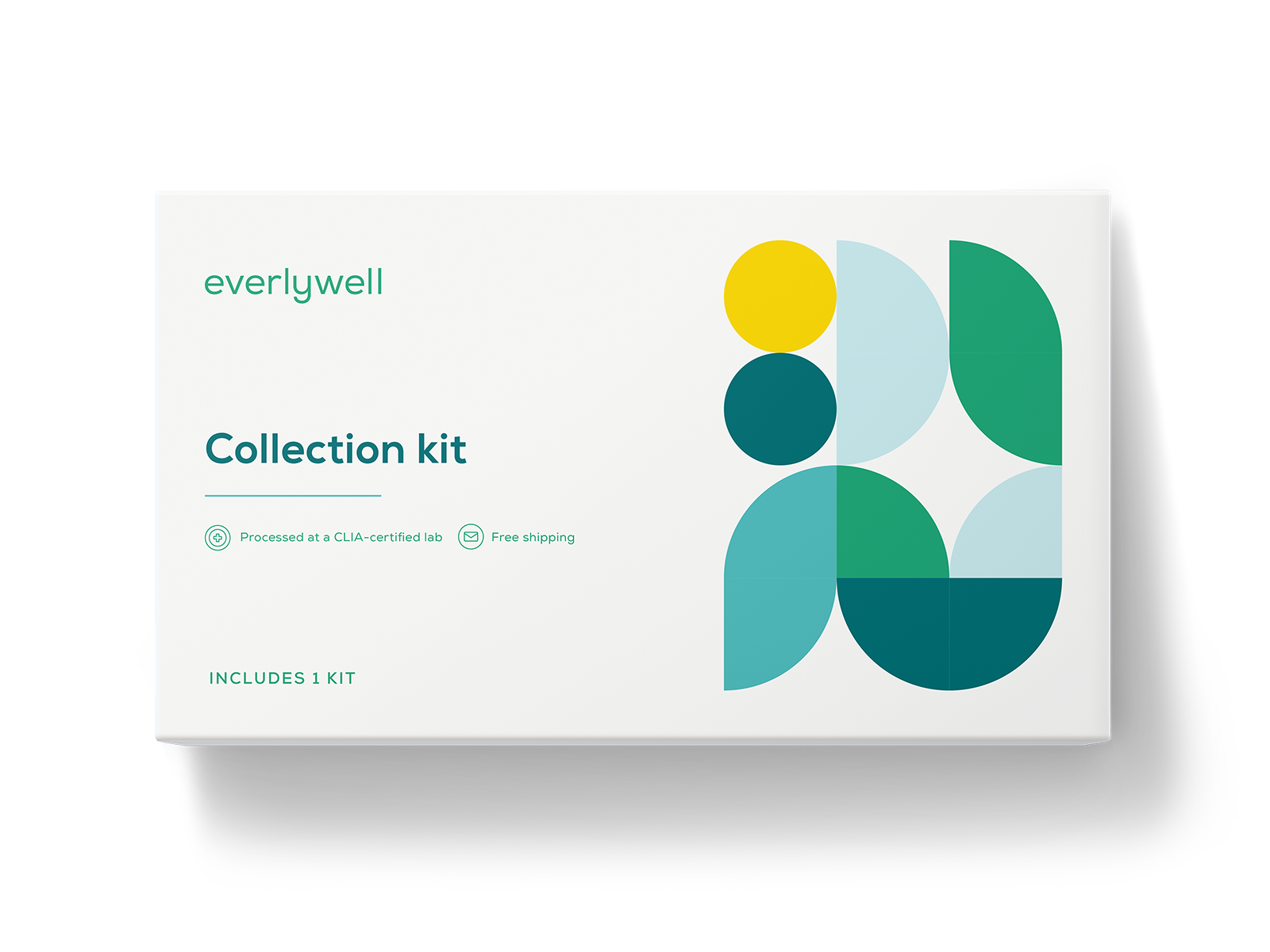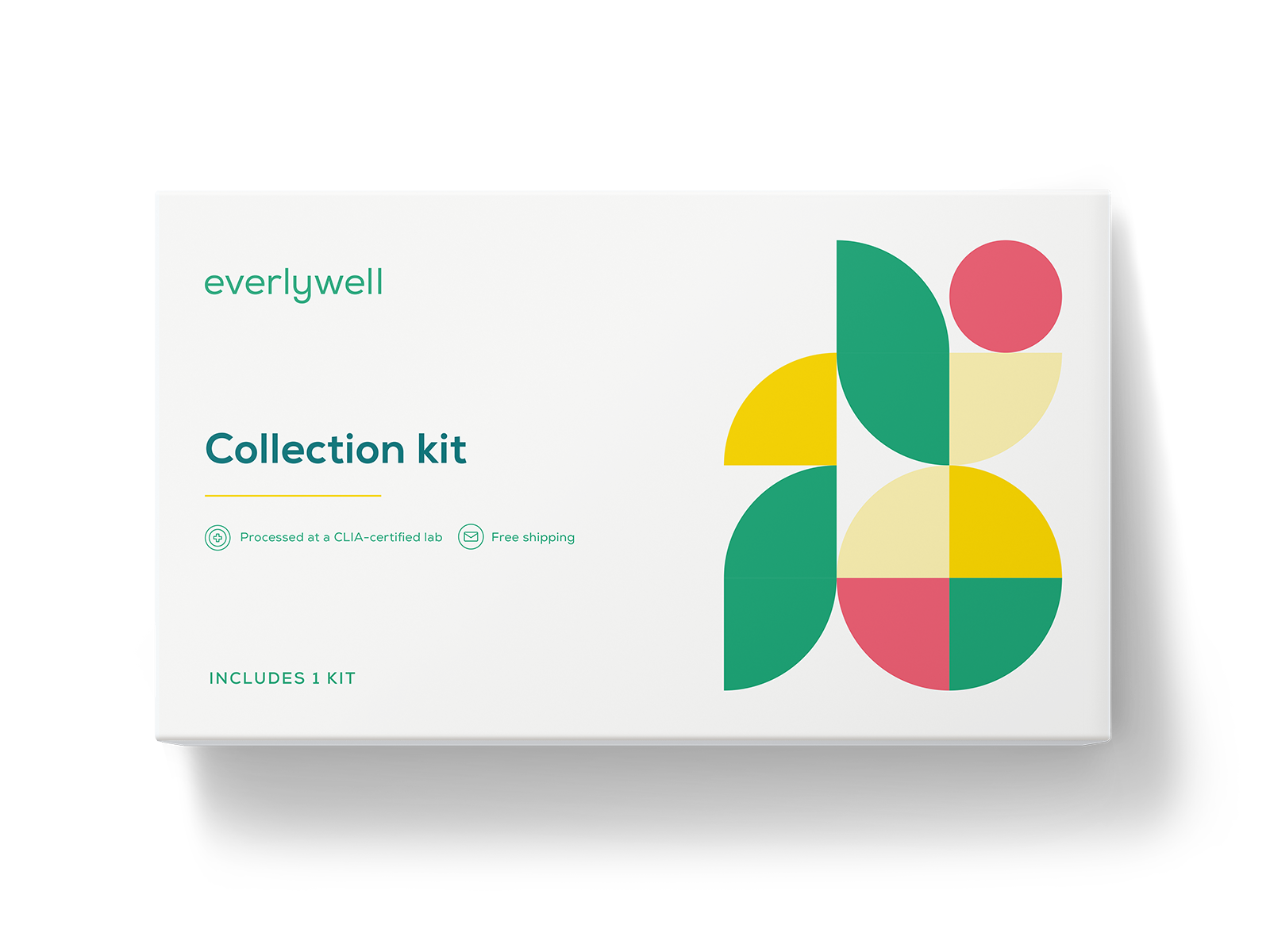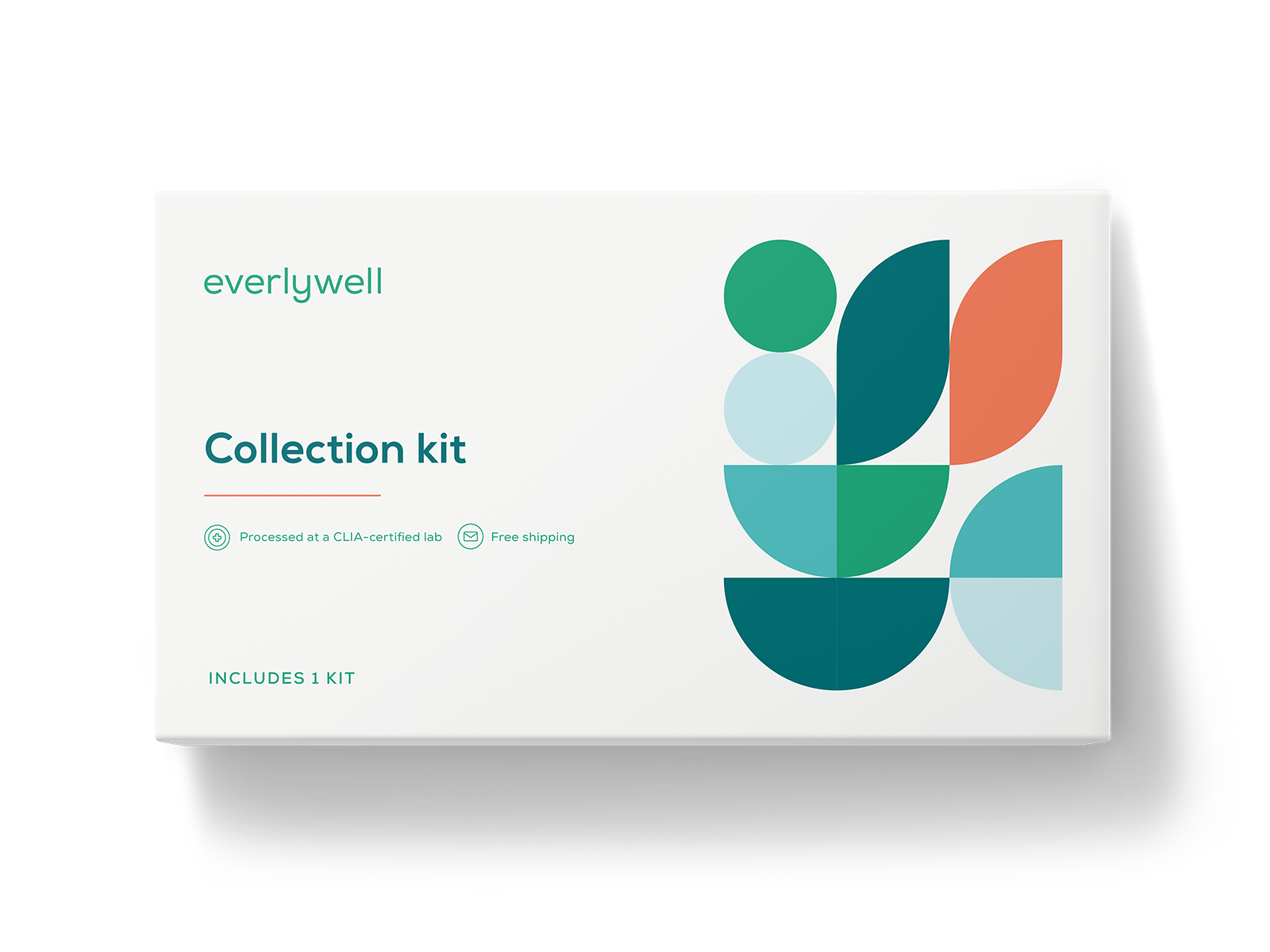Thyroid Test
/each
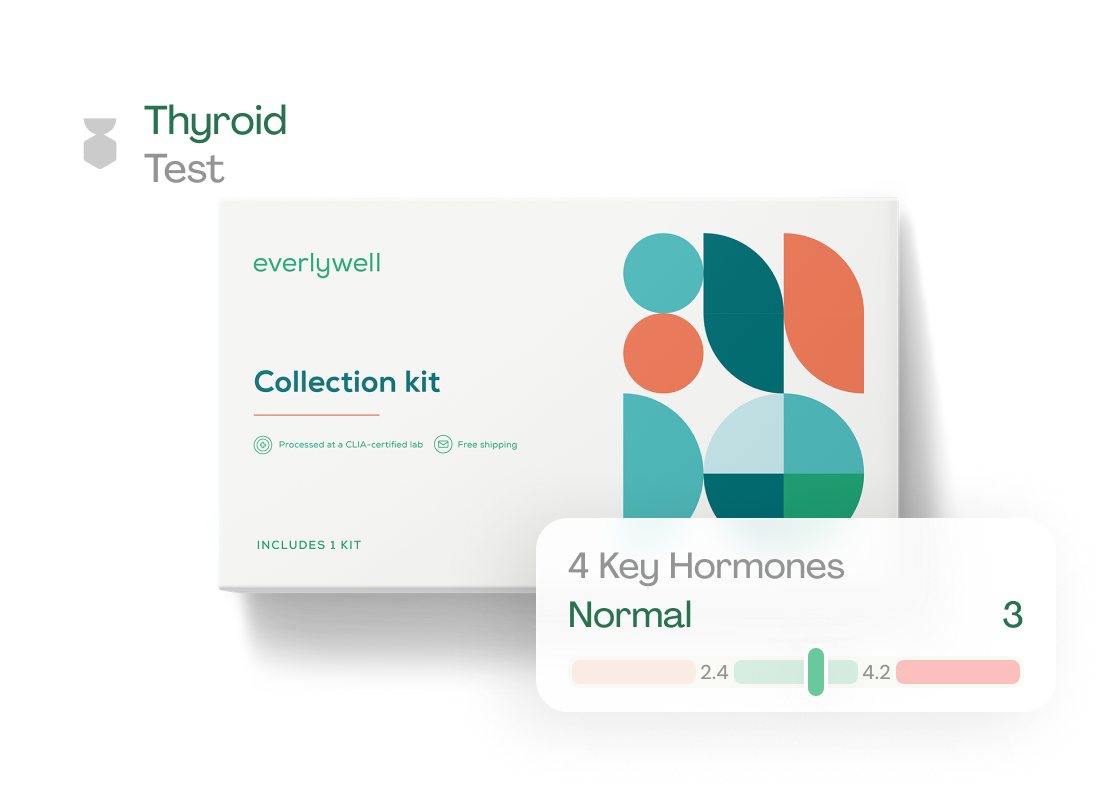

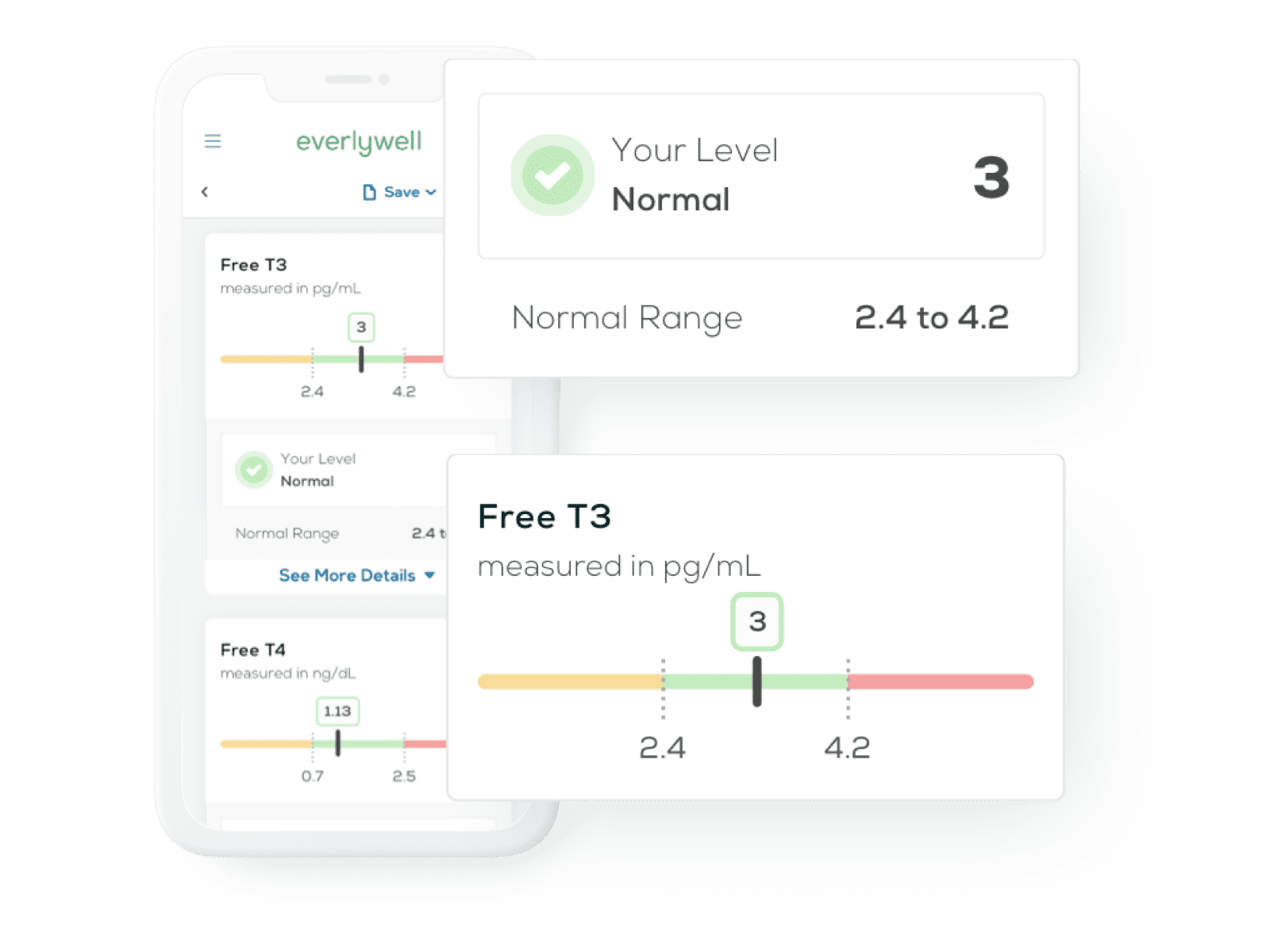

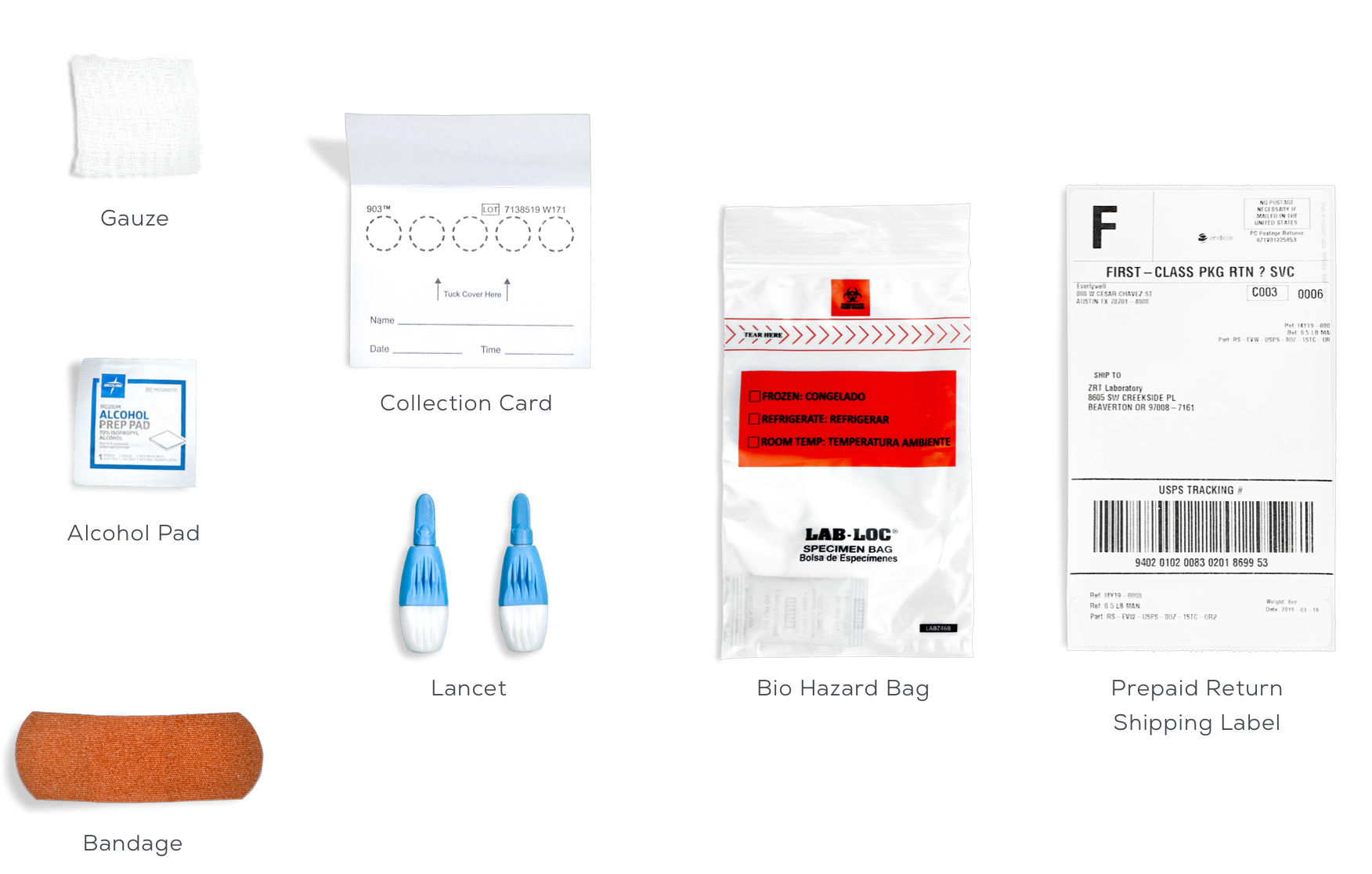

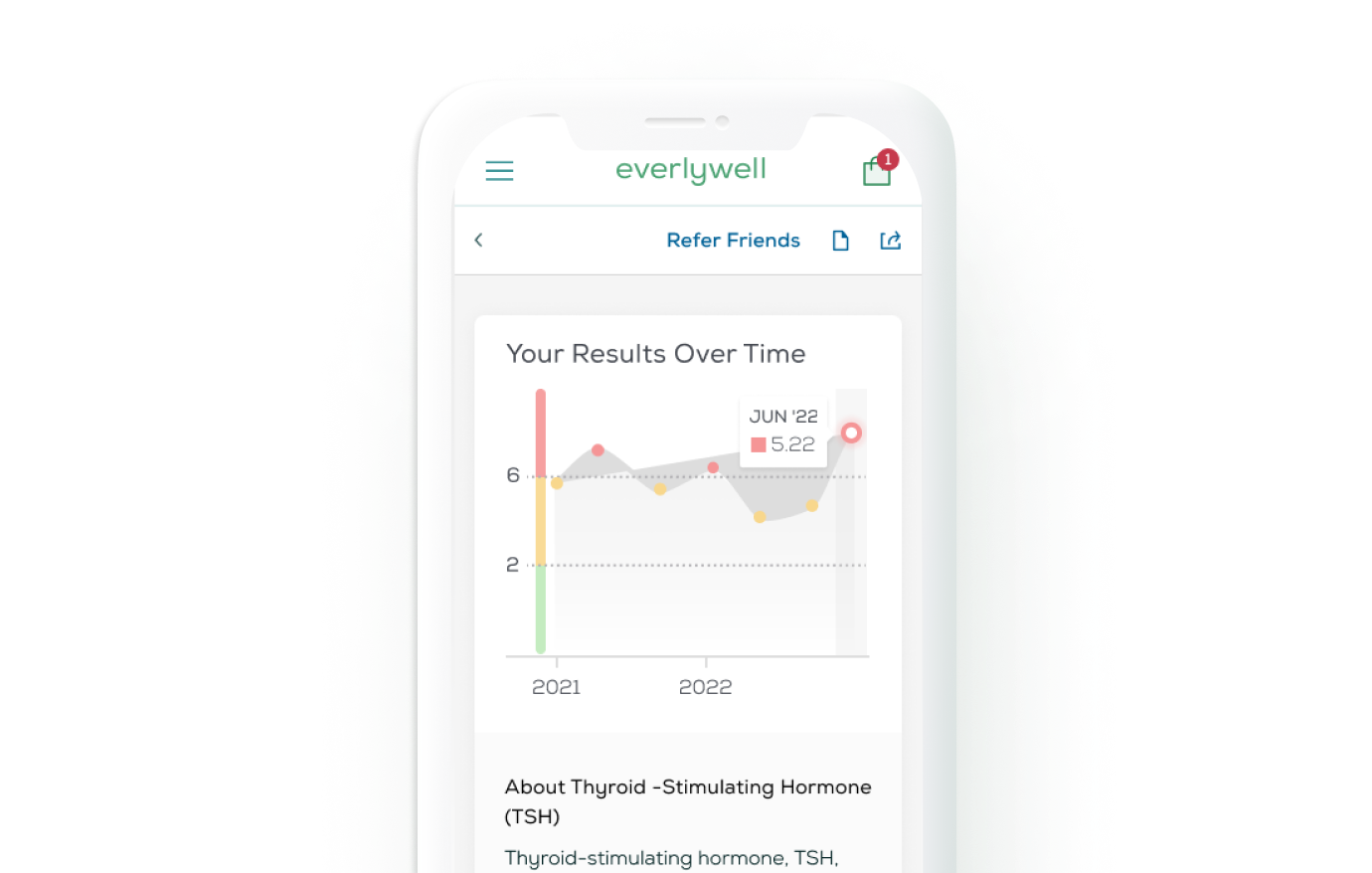



Experiencing sluggishness or fatigue, hair loss, weight change, gastrointestinal symptoms, dry skin, or increased sweating?
These symptoms could be a sign of thyroid dysfunction, which affects millions of people every day. Measure 4 key thyroid biomarkers in one test to understand your levels, and see if any of them may be keeping you from feeling your best.
Measures TSH, Free T3, Free T4, TPO Ab
Finger prick sample
Prescriptions available
This thyroid panel measures 3 main thyroid hormones plus thyroid peroxidase antibodies
Your test results will measure your levels of 3 main thyroid hormones plus thyroid peroxidase antibodies. These circulating thyroid hormones have an impact on many functions of the body. By measuring the level of each marker, this thyroid function test can help you understand if you may be experiencing thyroid dysfunction.
Thyroid-Stimulating HormoneThyroid-stimulating hormone, or TSH, is a hormone produced by the pituitary gland that is responsible for controlling the production of the thyroid hormones T3 and T4 by the thyroid gland. The hormone TSH is considered the most sensitive marker for screening for thyroid diseases and conditions.
Thyroid Peroxidase AntibodiesThyroid peroxidase antibodies are antibodies that can bind to thyroid enzymes, suppressing thyroid function. If TPO antibodies are elevated, this could be suggestive of an autoimmune condition. In the case of hypothyroidism, or an underactive thyroid, Hashimoto’s thyroiditis may be the culprit, whereas hyperthyroidism, or an overactive thyroid is commonly caused by Graves’ disease.
Free T3T3 (triiodothyronine) is a hormone produced by the thyroid gland. While it is less abundant than T4, T3 is considered the more active of these two thyroid hormones. Together, these two thyroid hormones help determine the rate at which every cell in the body uses energy. Levels of T3 fluctuate when individuals have an under- or overactive thyroid gland. This test measures free T3, the free (not bound to protein), and biologically active form of the hormone.
Free T4T4 (thyroxine) is the predominant hormone produced by the thyroid gland. Together, T3 and T4 help determine the rate at which every cell in the body uses energy. Levels of T4 fluctuate when individuals have an under- or overactive thyroid gland. This test measures free T4, the free (not bound to protein), and biologically active form of the hormone.
Changes in thyroid hormone levels can cause hypothyroidism (underactive thyroid) and hyperthyroidism (overactive thyroid). Both conditions can lead to a variety of uncomfortable symptoms in your body.
Body
- Sluggishness and fatigue
- Thinning hair
- Changes in weight
- Cold intolerance
- Heat intolerance
Mind
- Depression
- Forgetfulness
- Nervousness
- Anxiousness
- Irritability
Gastrointestinal
- Constipation
- Frequent bowel movements
Skin
- Dry skin
- Increased sweating
At-home testing made easy
- Pre-paid shipping (both ways)
- Everything you need to collect your sample and send it in
- Detailed directions and an instructional video
- Our care team is standing by if you have questions
- Digital (and printable) results
- Educational video sessions, led by healthcare professionals

Thyroid Test
Save with Everlywell 360
Learn moreEverlywell 360
• One 83-biomarker lab test, every year
• Personalized, clinician-reviewed Care Plan
• FSA/HSA eligible, no hidden costs
/per month, $399 billed annually
Free shipping
FSA / HSA accepted
Free shipping
FSA / HSA accepted
Better health starts here
How it all works
1
Register your test
Once your test arrives, head to everlywell.com or open your Everlywell app to register. Just Scan the QR code on the box to seamlessly plug in your test ID.


2
Test from the comfort of home
When you're ready, collect your sample and mail it in (following the directions in your kit) using the prepaid shipping label.


3
Get answers in days
Your physician-reviewed results will be ready in your account in a few days.
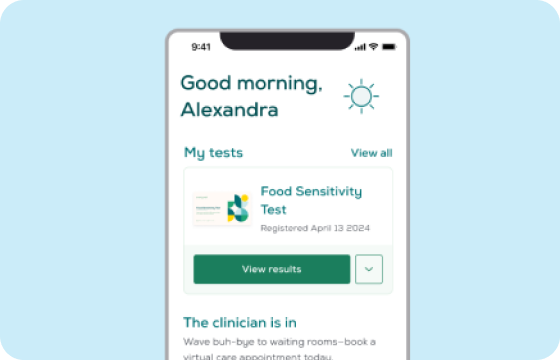

4
Healthy doesn’t happen alone
We'll offer lifestyle insights and guidance tailored to your results that you can use to make healthier choices.


1
Register your test
Once your test arrives, head to everlywell.com or open your Everlywell app to register. Just Scan the QR code on the box to seamlessly plug in your test ID.


2
Test from the comfort of home
When you're ready, collect your sample and mail it in (following the directions in your kit) using the prepaid shipping label.


3
Get answers in days
Your physician-reviewed results will be ready in your account in a few days.


4
Healthy doesn’t happen alone
We'll offer lifestyle insights and guidance tailored to your results that you can use to make healthier choices.



100% digital
Your results
Easy to access, even easier to understand
Gain meaningful insights about your health with easy-to-understand test results without the complex jargon.
You'll receive a complete breakdown of your report—including each marker tested and what your results mean for you.
Use your report to make an action plan with concrete next steps. And don't worry, we'll provide some additional resources and helpful tips along the way.
Care you can count on
Backed by science, reviewed by doctors

CLIA-certified laboratories
Each lab we work with is CLIA-certified (Clinical Laboratory Improvement Amendments). This means they must meet high standards to obtain both state and federal certifications and submit themselves to regular inspections.

Physician-reviewed results
All tests are reviewed by an independent board-certified physician within your state.

Your privacy matters
Everlywell is HIPAA-compliant. This means we never sell your health data and we always store it securely—in fact, we use state-of-the-art, bank-grade encryption.
Related tests
Customers also bought
FAQs
You have questions, we have answers
Though a part of the body that many people know little about, the thyroid plays a major part in daily wellness.
Both hyperthyroidism and hypothyroidism – too much thyroid activity and too little thyroid activity, respectively – are cause for concern. Because your thyroid controls much of your metabolism, which plays a vital role in your overall health, it’s important to monitor thyroid function. Hormone tests and thyroid scans may be helpful to many with related symptoms, as it is estimated that up to twelve percent of the population in the United States will develop thyroid disease during their lifetime. That’s almost fifteen million people who have thyroid gland problems, many of whom are unaware.
Anybody can experience thyroid disorder issues but some people are more susceptible than others:
Women (up to 10 times more likely than men to have thyroid disorders)
People with a family history of thyroid issues
Adults aged 50+
Individuals with type 1 diabetes
Women who have been pregnant within the past 6 months
People being treated with lithium for six months or more
Those with iodine deficiency or exposure
Smokers
People who have been exposed to radiation therapy, especially around the neck
Our at-home thyroid blood test is quick, easy, and convenient—allowing you to check your levels of the 3 main thyroid hormones as well as TPO antibodies without leaving your home.
Working with certified and experienced labs, our thyroid panel uses your blood spot samples to accurately measure various thyroid-specific hormones and compare those thyroid levels to common ranges.
The at-home thyroid test measures free T4, free T3, TSH, and TPO antibodies from a small blood spot sample taken with your kit.
TSH (thyroid stimulating hormone) controls thyroid gland function in the production of active thyroid hormones (T4 and T3), which together help control the rate at which your body uses energy. The thyroid hormone test also measures TPO antibodies, which are antibodies that your body may make that can suppress thyroid function. By measuring your levels of each, you can understand if you may be experiencing thyroid dysfunction.
Everlywell will provide detailed test result information of what a high or low level of TPO, free T4, free T3, or TSH means for your health.
At-home thyroid blood tests are a convenient starting point for determining whether you may have a thyroid condition and will give you an indication of what you should do next. For certain abnormal results, you will receive outreach to discuss potential next steps, and may be eligible to receive treatment, if applicable.
As always, we recommend sharing your results with your personal healthcare provider to discuss what your results mean for your specific case and to create a plan that’s best for you.
If your thyroid gland isn’t working correctly, it may be because you have an:
Underactive thyroid gland (hypothyroidism) – This means the thyroid is not producing enough thyroid hormone. Symptoms of hypothyroidism can include weight gain, fatigue, sensitivity to cold, muscle aches, and more.
Overactive thyroid gland (hyperthyroidism) – This means the thyroid is producing too much thyroxine (or T4). Symptoms of hyperthyroidism can include unexpected weight loss, nervousness and anxiousness, frequent sweating, heat insensitivity, and more.
If your thyroid is under-producing, you may experience ongoing symptoms including:
Sluggishness & fatigue
Weight gain
Muscle weakness, aches, tenderness
Feelings of sadness or depression
Cold sensitivity
Mental fogginess
Irregular or heavy menses (periods)
Constipation
Dry skin
Thinning hair
Low blood sugar
High cholesterol
If your thyroid is overactive you may experience symptoms like:
Unexpected or unusual weight loss
Rapid heartbeat
Increased appetite
Nervousness or anxiousness
Shaking or trembling
Frequent sweating
Heat sensitivity
Frequent bowel movements
Swelling in the neck (from enlarged thyroid)
Sleep difficulty
Thyroid tests use a blood sample to measure various hormone levels. Thyroid-stimulating hormone (TSH), for example, is often measured to indirectly check if your thyroid gland is producing enough thyroid hormones. TSH levels are usually higher than normal in TSH test results if you have an underactive thyroid (a condition known as hypothyroidism).
Thyroid gland function tests can also measure thyroid hormones like thyroxine (T4) to provide a better understanding of how low – or how high – your thyroid hormone levels are.
The Everlywell Thyroid Test measures TSH, free T3, free T4, and thyroid peroxidase antibodies.
The Everlywell at-home thyroid test can tell you if your thyroid hormone levels suggest hypothyroidism. This thyroid function test requires only a few drops of blood as a sample. After getting your online test results, you can easily see your levels of thyroid-stimulating hormone (TSH), free T3 and T4, and TPO antibodies. High TSH levels and/or low T3 and T4 can indicate hypothyroidism.
You can also take our thyroid test at home to check your hormones for indications of hyperthyroidism. Hyperthyroidism means your thyroid gland is overactive: it’s producing too many hormones. Low levels of TSH and/or high T3 and T4 can suggest hyperthyroidism.
The thyroid is a small gland that sits at the front of your neck. It’s responsible for controlling many of the body’s key activities – such as metabolism. It does this by releasing specific hormones into the bloodstream.
A hormone is a small chemical messenger that allows different parts of your body to “talk” with each other. The thyroid makes two kinds of hormones: thyroxine (or T4) and triiodothyronine (or T3). These hormones circulate in your blood, allowing the thyroid gland to regulate many of the body’s important functions, such as:
Metabolism – Thyroid hormones tell the body when to burn fat, which gives you more energy. Thyroid hormones can also trigger the production of glucose – a sugar formed from carbohydrates – to provide your body with more energy.
Heart rate – Thyroid hormones can affect your resting heart rate (the number of times your heart beats in a minute when you’re at rest).
Internal body temperature – Thyroid hormones are involved in regulating your body’s internal temperature – so the thyroid gland acts a bit like a thermostat that helps make sure your body doesn’t get too cool or too hot.
What’s more, thyroid hormones can contribute to more wakefulness and alertness because of how they affect the nervous system.
In short, your body requires the right balance of thyroid hormone levels in order to effectively carry out many of its functions.
While the thyroid gland helps regulate many processes in the body, another gland (the pituitary) is in charge of controlling the thyroid’s activity. The pituitary gland does this by releasing a hormone of its own – thyroid-stimulating hormone, or TSH – into the bloodstream, which carries TSH to the thyroid gland.
TSH tells the thyroid to pump out more thyroid hormones. So when your body needs more thyroid hormones, the pituitary gland will increase the amount of TSH in your blood. Thus, if a thyroid test shows you have a high TSH level, this can mean that your thyroid is underactive: it’s not making enough hormones. It can also mean that more TSH is required to keep thyroid hormone levels normal, which may indicate an evolving problem with the thyroid gland itself.
A full thyroid panel usually checks thyroid-stimulating hormone (TSH), triiodothyronine (T3), and thyroxine (T4) levels. In some cases, a blood test for thyroid function will also check your blood’s level of TPO antibodies. If you have abnormal thyroid hormone levels, high levels of TPO antibodies can point to an autoimmune thyroid disease as a possible reason for those abnormal levels.
It’s important to note that there is no hypothyroidism test that can check thyroid hormones and—based only on those test results—conclusively determine if someone has hypothyroidism. That’s because both thyroid hormone testing and a clinician’s evaluation of symptoms and medical history is required for a diagnosis.
A blood test for hypothyroidism is based on your levels of thyroid-stimulating hormone (TSH) and the thyroid hormones T3 and T4. Because TSH signals the thyroid gland to produce more thyroid hormones, unusually high TSH levels can mean that your thyroid isn’t making enough hormones.
A thyroid lab test might also measure T3 and T4 to reveal just how low your thyroid hormone levels are, which can help your healthcare provider decide on a thyroid treatment strategy.
Thyroid nodules are small bumps that can form inside the thyroid gland. Approximately 90% of thyroid nodules are non-cancerous; however, in some cases, these nodules may suggest the presence of thyroid cancer. Also, thyroid nodules can sometimes alter thyroid hormone levels, resulting in either hypothyroidism or hyperthyroidism.
Women are about 4 times more likely than men to have thyroid nodules. And older age, a history of thyroid radiation, and iron deficiency are all linked with a greater likelihood of having thyroid nodules.
Fast telehealth visits
Our expert team of clinicians will help you start your journey to better health
Schedule visit
